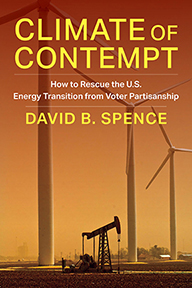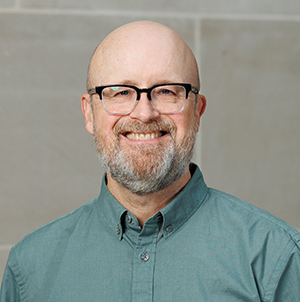By Clara Lincolnhol

Climate of Contempt cover. Image: Columbia University Press
“Be curious, not judgemental.” This quote from the popular comedy-drama “Ted Lasso” is how a professor of energy law recommends we approach conversations about energy policy and politics.
“We can be a force that fights against demonization and the nastiness online and instead ask questions to people who introduce an idea that’s different or contradicts what we believe,” said David Spence, a professor of energy law at the University of Texas Austin and author of “Climate of Contempt.”
Spence was at the MSU School of Journalism where he spoke in an environmental journalism class and at a public seminar sponsored by the Knight Center for Environmental Journalism.
“Climate of Contempt” (Columbia University Press, $28) covers the complex political nature of the energy transition in two major parts, with three chapters in each part. The energy transition, or reaching “‘net zero,” is the process of cutting carbon emissions until the carbon released is canceled out by the carbon absorbed.
The first part of the book focuses on the history of the energy industry, regulation and policy in the United States. The second part focuses on the political challenges posed by the current media landscape and discusses how to have more productive political conversations.
Five years ago Spence began writing “Climate of Contempt,” but 15 years ago he began his research into how social media and the internet impact people’s political behavior.
“It was making people angrier with each other, which is not conducive to learning and understanding,” Spence said. “I found that my suspicions were well-founded, and that’s why I wrote this book.”
Today people receive news more rapidly with less time to process it. Disinformation is rife online. Face-to-face political conversations have been replaced with online communication. And negatively charged news circulates faster than hard facts, he said.
All of this leads to more negative partisanship, Spence said.

Professor David Spence: Image: University of Texas at Austin
“We tend to develop caricature pictures of not only the issues but of each other, and it makes it much harder to support politicians who build majorities in Congress,” he said.
Reaching ‘net zero’ relies on combatting disinformation and finding common ground between parties, he said.
Spence emphasizes the importance of having conversations with those who hold different opinions – without the objective of “winning” – and instead figure out why people believe what they do.
“It’s about building a relationship with someone on the other side and continuing to talk about the issues in ways that don’t alienate each other,” he said. “We learn from people with different perspectives and we don’t see them face-to-face anymore.”
Although you may not sway someone’s vote, talking about climate change and the energy transition with someone who votes for another party allows for finding common ground, which leads to a better understanding of how the issues affect everyone.
More information about “Climate of Contempt” including Spence’s blog, additional resources for readers and a more detailed breakdown of each chapter can be found at climateofcontempt.com.
